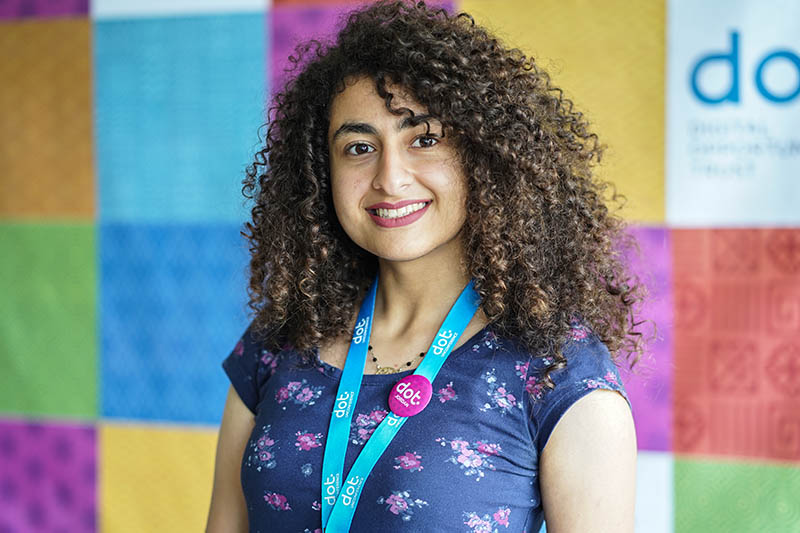Story
Lujain

Making blood sugar monitoring accessible in Jordan
Lujain Asem Abusohyon’s life changed when she was 17-years-old. “I felt tired but I did not know why. My eyes were blurred. It was exams at school and I did not understand why I could not focus,” Lujain, now 20, remembers. Then came the day in April when she was hospitalized after suddenly losing three kilograms. “This is how I found out I had type 1 diabetes,” she says.
Suddenly, her days were occupied by monitoring blood sugar levels. There were many challenges: Lujain hated pricking her finger with a lancet to draw blood for testing, and the costs that came with seeing a doctor or dietician about her condition. But now, the Jordanian looks back at that day in 2016 as a turning point for the better — and has created a new social innovation to help others see their diabetes experience the same way.
Lujain is the founder of No For Pricking, a blood sugar tracking app, sensor system, and online support group for people with diabetes. She started developing the innovation as part of a course that DOT Jordan was offering through her university. “I already had the idea, but I never thought it could be real,” Lujain says. There was then a DOT-organized sprint Impactathon event at her university. Lujain further refined her business idea over the course of these two days.
Once it launches, No For Pricking aims to make it easier for people with diabetes to monitor their blood sugar levels. Along with the smartphone app, diabetics can purchase a sensor that replaces the need for people to prick their finger for blood — hence the name of the innovation. “Sometimes I leave home and I forget my glucose reader, but I never forget my mobile phone,” says Lujain on the convenience of using a sensor over a conventional lancet.
Sensor technology exists but it is expensive and not yet in Jordan. Lujain intends to change that with No For Pricking. She plans to either work with someone to develop a sensor in Jordan, or partner with an existing company to provide the technology in her country. In addition to a minimal charge for the app, Lujain says sales of this sensor would be the main income generator for her business.
From the data side, the app will send a notification when a person’s blood sugar is dropping, or when it is time for their next insulin dose. It can also be used to count carbohydrates so people are sure they are using the appropriate dose of insulin. There is also the option for these readings to be sent to a parent, or directly to someone’s doctor.
No For Pricking also makes it easier for people to connect with a doctor or another diabetic. “Sometimes you need to ask a question related to your diagnoses and you cannot wait for one to three months to see a doctor,” Lujain explains. “I believe the emotional support through this app could help like nothing else in the world.”
Sometimes you need to ask a question related to your diagnoses and you cannot wait for one to three months to see a doctor. I believe the emotional support through this app could help like nothing else in the world.
Connecting people who have to prick
That emotional support is not limited to the No For Pricking app. “When I was diagnosed I felt like I was the only one in the world who had this problem,” says Lujain. That feeling of isolation was what led her to create a Facebook page called Humans of Diabetes. The page is a spin-off of the well-known Humans of New York account that uses a single photo and short text story to introduce readers to a person’s life.
Lujain also started a diabetes support club in her hometown of Irbid. That group meets once a week for two hours and has inspired another woman in Jordan’s capital city, Amman, to start a similar diabetes support group. Here, diabetics from all ages can come together and talk about the condition, for better or worse.
For Lujain, each aspect of No For Pricking comes back to one central theme: making the best of what you have been given. “There are a lot of things I do not like about diabetes, but I would never give it back because of the lessons I have learned,” she says with a smile.
At DOT we’re excited to bring you inspiring stories that highlight the impact of daring young social entrepreneurs. Social entrepreneurship and social innovation is an ongoing journey, so we invite you to follow along with Lujain by following her on Twitter at @AsemLujain.
This #DOTYouth Spotlight was developed as a part of DOT’s 2018 Unconference in Nairobi, Kenya, supported by the Government of Canada through Global Affairs Canada.
Are you our next Community Leader, Digital Champion, or Social Innovator? Learn more about how to join #DOTYouth
Join #DOTYouthShare this Story
More STORIES
Read more inspiring stories like Lujain.